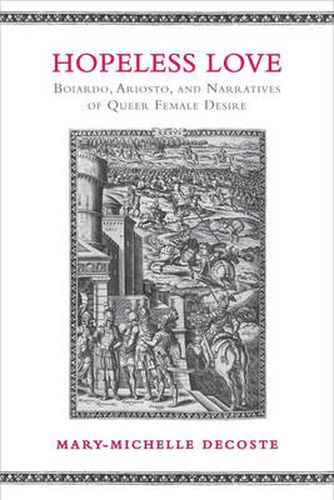Readings Newsletter
Become a Readings Member to make your shopping experience even easier.
Sign in or sign up for free!
You’re not far away from qualifying for FREE standard shipping within Australia
You’ve qualified for FREE standard shipping within Australia
The cart is loading…






Book three of the Italian poet Matteo Maria Boiardo’s epic poem Orlando innamorato (Orlando in Love) was published posthumously in 1494; in 1532, the poet Ludovico Ariosto published his final version of a sequel, Orlando furioso (The Frenzy of Orlando). At the end of his poem, Boiardo tells the tale of the princess Fiordispina’s unfulfilled desire for the maiden warrior Bradamante, a story that Ariosto retells in the body of his later work.
In Hopeless Love, Mary-Michelle DeCoste examines both versions of the Fiordispina and Bradamante episode using feminist and queer theory. DeCoste then links these treatments of queer female desire to their wider cultural contexts by exploring their antecedents in genres such as medieval romance epic and hagiography and by examining similar tropes in other sixteenth-century romance epics. An important work on a previously overlooked subject, Hopeless Love uncovers the diffusion of queer female desire in Italian literature and promotes a better understanding of sexuality in medieval and Renaissance Europe.
$9.00 standard shipping within Australia
FREE standard shipping within Australia for orders over $100.00
Express & International shipping calculated at checkout
Book three of the Italian poet Matteo Maria Boiardo’s epic poem Orlando innamorato (Orlando in Love) was published posthumously in 1494; in 1532, the poet Ludovico Ariosto published his final version of a sequel, Orlando furioso (The Frenzy of Orlando). At the end of his poem, Boiardo tells the tale of the princess Fiordispina’s unfulfilled desire for the maiden warrior Bradamante, a story that Ariosto retells in the body of his later work.
In Hopeless Love, Mary-Michelle DeCoste examines both versions of the Fiordispina and Bradamante episode using feminist and queer theory. DeCoste then links these treatments of queer female desire to their wider cultural contexts by exploring their antecedents in genres such as medieval romance epic and hagiography and by examining similar tropes in other sixteenth-century romance epics. An important work on a previously overlooked subject, Hopeless Love uncovers the diffusion of queer female desire in Italian literature and promotes a better understanding of sexuality in medieval and Renaissance Europe.